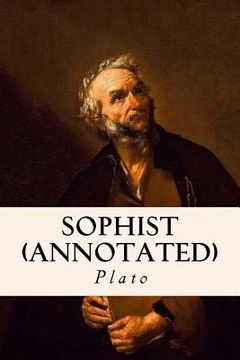Reseña del libro "Sophist (annotated) (en Inglés)"
The Sophist is a Platonic dialogue from the philosopher's late period, most likely written in 360 BC. Its main theme is to identify what a sophist is and how a sophist differs from a philosopher and statesman. Because each seems distinguished by a particular form of knowledge, the dialogue continues some of the lines of inquiry pursued in the epistemological dialogue, Theaetetus, which is said to have taken place the day before. Because the Sophist treats these matters, it is often taken to shed light on Plato's Theory of Forms and is compared with the Parmenides, which criticized what is often taken to be the theory of forms. The dialogue is unusual in being one of three that do not feature Socrates, although as in its sequel, the Statesman, he is present to play a minor role (the other dialogue is the Laws). Instead, the Eleatic Stranger takes the lead in the discussion. The fact that Socrates is present but silent makes it difficult to attribute the views put forward by the Eleatic Stranger to Plato, beyond the difficulty inherent in taking any character to be an author's "mouthpiece." This dialogue takes place a day after Plato's Theaetetus, and aims at defining the sophist. The participants are Socrates, who plays a minor role, a young mathematician, Theaetetus, and a visitor from Elea, the hometown of Parmenides The Eleatic Stranger pursues a different method of definition than features in Plato's other dialogues by the use of a model, comparison of the model with the target kind, collection, and division (diairesis), of the collected kinds. At first he starts with the use of a mundane model (a fisherman), which shares some qualities in common with the target kind (the sophist). This common quality is the certain expertise (techne) in one subject. Then through the method of collection of different kinds (farming, caring for mortal bodies, for things that are put together or fabricated and imitation), he tries to bring them together into one kind, which he calls productive art. The same is true with the collection of learning, recognition, commerce, combat and hunting, which can be grouped into the kind of acquisitive art. After these two collections, he proceeds to the division of the types of expertise into production and acquisition, and then he tries to find out to which of these two sub-kinds the fisherman belongs (classification), in this case, the acquisitive kind of expertise. By following the same method, namely, diairesis through collection, he divides the acquisitive art into possession taking and exchanging goods, to which sophistry belongs. The sophist is a kind of merchant. After many successive collections and divisions he finally arrives at the definition of the model (fisherman). Throughout this process the Eleatic Stranger classifies many kinds of activities (hunting, aquatic-hunting, fishing, strike-hunting)

